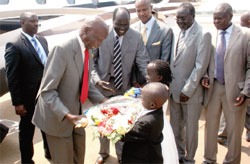By Peter Opiyo in Juba
Juba is awash with the South Sudan's flag, the streets have been swept clean, dress rehearsals finalised, the military standing guard, and everyone's hopes are high.The aura is ecstatic as residents march the streets and rhythmic tunes of the new national anthem chime, filling the air as a nation is born. |
Former President Moi (second left) arrives for the ceremony in South Sudan. Pictures: Collins KWEYU/STANDARD
Uncover the stories others won’t tell. Subscribe now for exclusive access
- Unlimited access to all premium content
- Uninterrupted ad-free browsing experience
- Mobile-optimized reading experience
- Weekly Newsletters
- MPesa, Airtel Money and Cards accepted
|